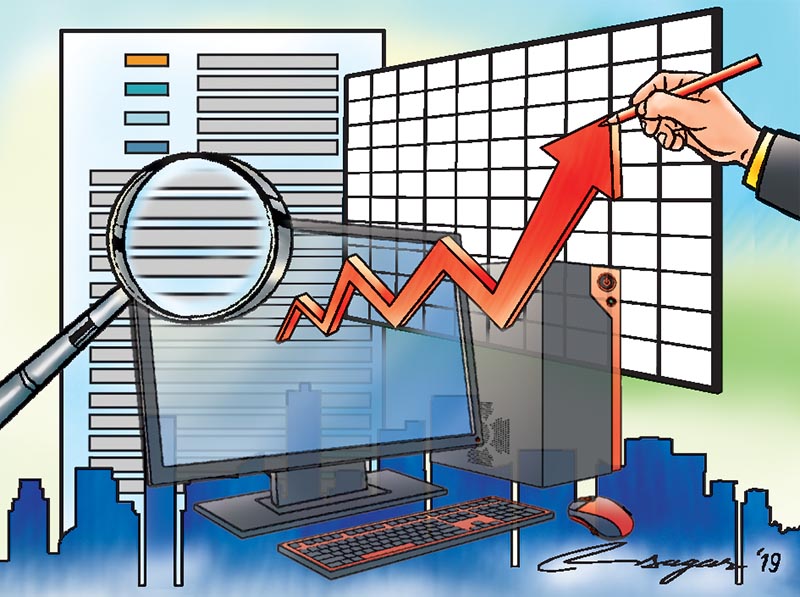Open data: A non-rival good
The non-rivalrous nature of data has aided the growth of big data, and technology has reduced data dissemination cost. The data points will expand as the economy grows and new production agents enter the economic dynamics
Data, once thought to be useful only to academics, historians and statisticians, is now considered as an essential apparatus for development, owned by all from activists to presidents. The vast majority of data that exists today was generated in just the past few years. For instance, the International Business Machine (IBM) estimated that 90 per cent of the data that existed in 2013 was produced in the preceding two years, and the world generates 2.5 quintillion bytes of data each day with the growth of the internet.
One of the inherent characteristics of data is that it is a non-rival good, which means that one person’s consumption of the good does not restrict someone else from using that same good at the same time. Let us take an analogy of machinery (capital) in mainstream economics. Because each engineer needs her apparatus, and each driver needs his forklift, the use of machinery by one engineer prohibits the simultaneous use of the same machinery by another. This is obviously not the case for data, as even if every data enthusiast in an economy were to use the available data simultaneously, the data “stock’ would never decrease, thereby allowing others to use it. The continuous and simultaneous use of data will only yield more returns, confirm the data and help generate additional stock of refined statistics.
Before moving forward, it should be made clear that the creation of optimum data does not necessarily depend on generating and disseminating it on sheer volume, but on the ability to open up the data, make it transparent and liquid. To open up the data means to make it available online free of cost, in a machine-readable format, so that anyone can use and re-use it for any purpose. The concept mirrors the characteristics of “common informational goods” proposed by Nobel Laureate Elinor Ostrom. Ostrom stated that the specificity of “information commons”, highlighting a new kind of public good use - information - does not dilute the common stock, but augments it. Not surprisingly, the global consulting firm McKinsey estimated in 2013 that “open data can help unlock more than $3 trillion in economic value annually worldwide”.
In Nepal, it seems the government has been gearing up to realise the value of open data, as the Prime Minister recently launched the national data portal. The finance minister additionally remarked that the “open data system will be developed to provide factual information for evidence-based decision-making”. Moreover, the existence of the Right
to Information (RTI) Act 2007 provides a legal mandate to implement “the right to information”
enshrined in the Constitution 2015. When demand for data-driven insights intersects with more open data and rapid advances in analytic capabilities, the adoption of big data will scale up.
Within Nepal, we see government agencies taking small but fundamental steps by introducing open government data portals, and open data web pages. Also, an increasing number of innovative companies are helping local governments produce open data portals. Recently, the World Bank, with support from the Department for International Development (DFID), Nepal, took one more step in this direction and organised the Nepal Data Literacy Programme. As fittingly remarked by the Country Manager of the World Bank in Nepal, FarisHadad-Zervos, “We help people find solutions to their complex problems through the power of data.” It is understood that the citizens of Nepal may begin to demand more refined and organised data as they get more data literate, and may start to use open data for all kinds of things, from carrying out economic policy analysis to creating new stories and fostering bottom-up governance, which will eventually have an impact on public service delivery.
The inherently non-rivalrous nature of data has aided the exponential growth of big data, and the advancement of technology has reduced data dissemination cost. The data points will expand as the economy grows and new production agents enter the economic dynamics. For instance, the goods and services that were purchased before are now produced by the consumers in new forms - Uber, Airbnb, Tootle, Pathao, Foodmario, Foodmandu. These insights that can be traced to the new data points created by the internet, which can then reveal policy implications never thought of before. Hence, open data demands data philanthropism from the private sector as well. On the one hand, analytics fostered by open data can help reveal price anomalies (sites that offer price comparisons, for example) and help bring market efficiency and reduce information asymmetry. On the other hand, data philanthropism from the corporate sector can enable data to improve well-being and save lives of people.
With the technological diffusion of the 20th century, oil became the core energy source. Now, data - non-rivalrous and arguably even more valuable than oil - heralds the fourth industrial revolution. As we sit on the cusp for countries like Nepal to ride the forthcoming industrial wave, they will have to advance further and take more steps in cementing the policy and programmatic preparations needed to liberate and fully realise the value of open data.
Dixit is an economist based in Nepal






